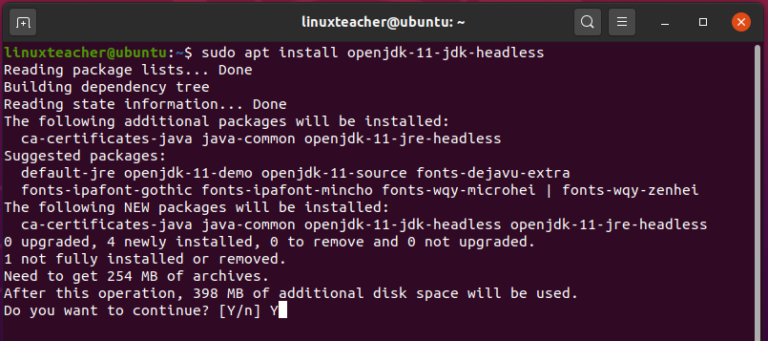

- #INSTALL OPENJDK 11 DEBIAN REPOSITORY INSTALL#
- #INSTALL OPENJDK 11 DEBIAN REPOSITORY UPDATE#
- #INSTALL OPENJDK 11 DEBIAN REPOSITORY MANUAL#
- #INSTALL OPENJDK 11 DEBIAN REPOSITORY VERIFICATION#
Repositories are also available, for all Linux distributions mentioned above minus Fedora (it didn't work for me on Fedora 29) and Alpine Linux. tar.gz binaries, and Alpine Linux specific builds.
#INSTALL OPENJDK 11 DEBIAN REPOSITORY INSTALL#
On Linux, there are DEB and RPM packages to make it easy to install on Debian, Ubuntu, RHEL, Fedora, Oracle Linux or SLES and so on, as well as. The Zulu OpenJDK builds are available for Windows, macOS and Linux. Zulu is free and open source software (and freely redistributable), and offers up to date OpenJDK builds of Java 17, 16, 15, 13, 11, 8, and 7. DEB, RPM and tar.gz binaries available, as well as apt and yum repositories.Īzul Systems provides tested, certified builds of OpenJDK, under the name of Zulu. OpenJDK 64-Bit Server VM (build 11.0.8+10-post-Ubuntu-0ubuntu120.A more accurate title would be (but it's way too long): install the latest OpenJDK 17, 16, 15, 13, 11, 8 and even 7 in Ubuntu, Debian, Linux Mint, RHEL, or SLES using the free, open source Zulu OpenJDK builds by Azul Systems. OpenJDK Runtime Environment (build 11.0.8+10-post-Ubuntu-0ubuntu120.04)
#INSTALL OPENJDK 11 DEBIAN REPOSITORY MANUAL#
Update-alternatives: using /usr/lib/jvm/java-11-openjdk-amd64/bin/java to provide /usr/bin/java (java) in manual mode Press to keep the current choice, or type selection number: 1 * 0 /usr/lib/jvm/java-14-openjdk-amd64/bin/java 1411 auto modeġ /usr/lib/jvm/java-11-openjdk-amd64/bin/java 1111 manual modeĢ /usr/lib/jvm/java-14-openjdk-amd64/bin/java 1411 manual mode Make sure you type the number of the version you want using as the default Java and press the Enter key: There are 2 choices for the alternative java (providing /usr/bin/java). For example, change the default Java version, run the update-alternatives command: We can use symbolic links to setup the default Java version. $ sudo apt install openjdk-11-jdk Setting up the default Java version For example, here I am going to install OpenJDK 11: It allows us to run different apps as per the Java version.

We can install multiple versions on Ubuntu. OpenJDK 64-Bit Server VM (build 14.0.1+7-Ubuntu-1ubuntu1, mixed mode, sharing) Step 3 – Install multiple versions of Java/OpenJDK OpenJDK Runtime Environment (build 14.0.1+7-Ubuntu-1ubuntu1) $ java -version openjdk version "14.0.1"
#INSTALL OPENJDK 11 DEBIAN REPOSITORY VERIFICATION#
Installing OpenJDK version 14 on Ubuntu server Step 2 – Verification $ sudo apt install openjdk-14-jdk-headless

#INSTALL OPENJDK 11 DEBIAN REPOSITORY UPDATE#
Update the repo and then install the OpenJDK version 14 using the apt command: Step 1 – Installing OpenJDK version 14 on Ubuntu 20.04 LTS The headless version is for server users where you don’t need desktop GUI components of JAVA. Openjdk-14-jre-zero - Alternative JVM for OpenJDK, using Zero Openjdk-14-jre-headless - OpenJDK Java runtime, using Hotspot JIT (headless) Openjdk-14-jre - OpenJDK Java runtime, using Hotspot JIT Openjdk-14-jdk-headless - OpenJDK Development Kit (JDK) (headless) Openjdk-14-jdk - OpenJDK Development Kit (JDK) Openjdk-13-jre-zero - Alternative JVM for OpenJDK, using Zero Openjdk-13-jre-headless - OpenJDK Java runtime, using Hotspot JIT (headless) Openjdk-13-jre - OpenJDK Java runtime, using Hotspot JIT Openjdk-13-jdk-headless - OpenJDK Development Kit (JDK) (headless) Openjdk-13-jdk - OpenJDK Development Kit (JDK) Openjdk-11-jre-zero - Alternative JVM for OpenJDK, using Zero Openjdk-11-jre-headless - OpenJDK Java runtime, using Hotspot JIT (headless)

Openjdk-11-jre-dcevm - Alternative VM for OpenJDK 11 with enhanced class redefinition Openjdk-11-jre - OpenJDK Java runtime, using Hotspot JIT Openjdk-11-jdk-headless - OpenJDK Development Kit (JDK) (headless) Openjdk-11-jdk - OpenJDK Development Kit (JDK) Openjdk-8-jre-zero - Alternative JVM for OpenJDK, using Zero/Shark Openjdk-8-jre-headless - OpenJDK Java runtime, using Hotspot JIT (headless) Openjdk-8-jre - OpenJDK Java runtime, using Hotspot JIT Openjdk-8-jdk-headless - OpenJDK Development Kit (JDK) (headless) $ apt-cache -names-only search 'openjdk-*-(jre|jdk)' | sort -t '-' -k 2 -nĭifferent versions of JDK and JRE available for installation: openjdk-8-jdk - OpenJDK Development Kit (JDK) Let us find out about versions using the apt-cache command and sort command: Ubuntu Linux ships with OpenJDK version 8 and 14.


 0 kommentar(er)
0 kommentar(er)
